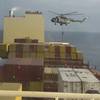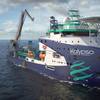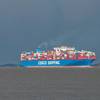Dangers of Chemical Cargo Misdescription
The London P&I Club reported that one of its members recently suffered an onboard fire as a result of the wilful misdescription by shippers of a chemical cargo. London P&I warns that there is a danger of further such incidents occurring, given the nature of modern transport logistics.
The cargo involved was calcium hypochlorite, a chemical in widespread use throughout the world, most commonly in the treatment and purification of water, and which has some inherent properties which can make it extremely dangerous. For example, if it becomes too hot, or contaminated with impurities, a reaction may set in, leading to fire or explosion.
Several such incidents occurred in the late 1990s, some involving explosions in onboard containers which resulted in extensive damage to large oceangoing ships. Subsequently, both the International Group and IMO issued guidance on the carriage of calcium hypochlorite, and the IMDG Code was amended. A number of carriers went further and simply refused to accept any calcium hypochlorite cargoes.
In the latest issue of its StopLoss Bulletin, the London Club says, “A Club member recently experienced a fire on board one of its ships which originated in a calcium hypochlorite cargo which, in order to circumvent the carrier’s prohibition of carriage, had been deliberately misdescribed by the shipper as ‘calcium chloride’.
“Given the nature of modern transport logistics, there is a strong likelihood of further such misdescriptions occurring, either intentionally or inadvertently, particularly since international rules to ensure the safe transportation of chemicals are not applied universally.
“Voluntary schemes do exist, however, to promote safe practice in the carriage of chemicals. One such is the Chemical Distribution Institute (CDI) Marine Packed Cargo scheme, which has already been adopted by major shipping lines, terminals and freight forwarders. The scheme, which is shortly to be renamed the International Marine Packed Cargo Audit Scheme, provides audit reports on each category of service provider in the distribution supply chain. It includes shipping companies, ships, tank container operators, container freight stations, freight forwarders, ship agents, and container terminals.”
















